The PN framework that improves healthspan, longevity, and quality of life
This approach will “add life to your years” and not just “years to your life.” The post The PN framework that improves healthspan, longevity, and quality of life appeared first on Precision Nutrition.

There’s been a growing shift in the fitness, health, and wellness industry.
The promise of “immediate results” will probably never lose its sparkle.
But, as a good portion of our population (hi, Boomers!) moves into their “silver” years, conversations around optimizing lifespan (how long you live) and healthspan (how long you live with a high quality of life) are also on the rise.
People are more interested than ever in longevity, which, these days, means the combination of a long lifespan and a long healthspan. (Historically, longevity and lifespan were synonymous.)
Trending too is the concept of biological age—essentially, how “old” your cells are, determined by their health and functioning. (Compare this to chronological age, which just refers to how many years you’ve been on this planet.)
Increasingly, people want to improve their overall health—for the long haul.
Of course, the wellness market is responding to this trend with supplements, ultra-specific diet plans, I.V. therapy, cold plunges, and other fringe modalities that promise to reduce or slow biological aging.
While some of these therapies are questionable, the movement that inspired them is great; For many of us in the health and fitness industry, the shift toward holistic health and long-term wellbeing is a welcome one.
At PN, we’ve held and promoted this expanded view of health for a while now.
We call it Deep Health
Deep Health is a “whole-person, whole-life” phenomenon that involves thriving in all dimensions of the human experience.
This framework of health includes six interdependent dimensions that influence and interact with each other.
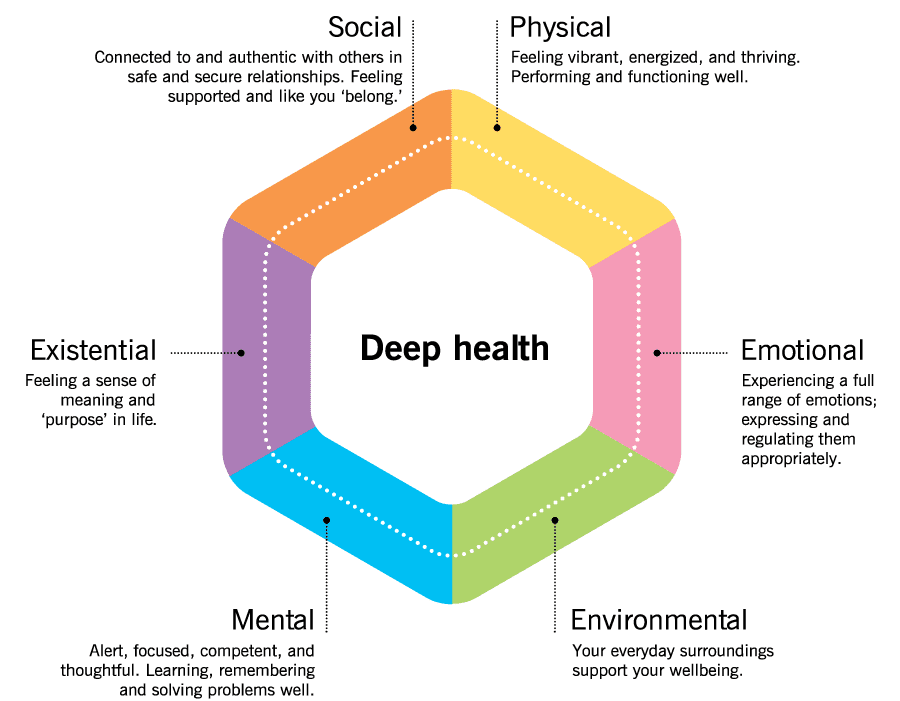
These six dimensions are:
 Physical health
Physical health
The one we all know best, and what people have historically thought of when thinking about health.
This is how your body feels, functions, and performs.
We measure physical health with blood work—such as your cholesterol and hormone levels and your blood pressure—as well as performance metrics like V02 max and demonstrations of strength, and subjective measures like energy and pain levels.
 Emotional health
Emotional health
This is about feeling a full range of emotions, but having more positive than negative feelings.
You can recognize, regulate, and appropriately express your emotions directly, maturely, and honestly. You have the resilience to recover from strong emotions, and calm yourself when you become stressed, anxious, or upset.
 Environmental health
Environmental health
This is about being and feeling safe and secure, as well as being and feeling supported by your everyday surroundings.
You have access to resources (health care, healthy food, clean air and water, nature) that support your goals and wellbeing.
 Mental or cognitive health
Mental or cognitive health
This is related to how well you think, learn, remember, and creatively problem-solve.
Your mind is sharp, and you’re able to be your most productive and do your best thinking.
This dimension also includes your mindset, capacity for insight, and your perspective and outlook on the world.
 Existential or purposeful health
Existential or purposeful health
Some might think of this as spiritual or soul health.
You have a deeper “why” or purpose for your life; you feel part of a “bigger picture.”
You have a strong sense of yourself and your intrinsic self-worth. You work to fulfill your purpose by choosing behaviors that align with your identity and values.
 Social or relational health
Social or relational health
This is about connecting and interacting well with others.
You develop and maintain authentic, fulfilling relationships. You have a sense of belonging, and you feel respected, “seen,” valued, and supported by others.
If you have Deep Health, it’s almost a guarantee…
You’re experiencing a life well-lived. A vibrant, thriving life that’s healthy in every sense of the word.
Not surprisingly, such a life is also statistically more likely to last longer, with more of those years being enjoyable.
(For more on Deep Health, plus how you can use the concept to transform your own—or your clients’—health, read: The “Deep Health” coaching secret)
High-impact habits to boost Deep Health (and by extension healthspan, longevity, and biological age)
While there are many things that can impact healthspan, longevity, and biological age, the following will give you the best return on investment.
These aren’t always the “sexiest” actions, nor are they likely to sound “cutting edge” (partly because they’ve been tested by time and robustly proven by decades of research).
But—if you’re looking to maximize Deep Health for as long as possible—they’re the things worth spending your time on.
The most important thing is being active.
If there’s a “magical panacea” out there, it’s exercise.
Before you start beating yourself up for not being “a gym person”…
…Any activity helps…
…At any dose.
Whether you clean your yard, vacuum, play games with your pets or kids, or just do a little walking, tell yourself, “I’m doing great!”
Because you are. These activities make a positive, measurable difference.
If you want to level up, get in a mix of aerobic or cardiovascular exercise, strength training, and stability work (like yoga, tai chi, or balance-challenging exercises).
Again, these can be in whatever amounts you can, in ways you enjoy.
For quintuple stars, aim for at least 150 minutes per week of moderate aerobic exercise (or 75 minutes of intense aerobic exercise), plus two or more strength and stability training sessions per week. (If you do these activities with friends—bonus!—now you’re boosting social health too.)
In general, the more activity the better. (So long as you enjoy it—and your body is recovering adequately.)
A thoughtful diet—and a mindful approach to other substances—is big, too.
Rather than focus on food you “shouldn’t be eating,” center your attention on the abundance of foods that serve your health and wellbeing.
We’re talking:
- Lean proteins (which can come from animals and/or plants, like fish, chicken, tofu, eggs, tempeh, Greek yogurt)
- A rainbow of fruits and vegetables (fact: different colors provide different nutrients and benefits, so aim to eat all of the colors regularly)
- Minimally-processed carbohydrates (whole grains, beans and lentils, starchy tubers like potatoes and sweet potatoes, and winter squash)
- Healthy fats (from nuts, seeds, avocados, extra virgin olive oil, nut butters, and a little dark chocolate)
For help choosing higher-quality versions and a wide variety of the above categories, check out one of our most popular infographics: ‘What should I eat?!’ Our 3-step guide for choosing the best foods for your body
To stay hydrated, drink plenty of water. For variety, emphasize mostly zero-calorie drinks like unsweetened tea and coffee. (If you’re confused about how much fluid to drink every day, you’ll love the “pee chart” in this article: ‘How much water should I drink?’)
Avoid smoking or chewing tobacco, and if you drink alcohol, do so lightly to moderately.
And of course, getting quality sleep and regulating stress makes everything better.
Get enough quality sleep by prioritizing and protecting the time you rest.
Make your sleeping area as comfortable, quiet, and dark as possible. Figure out when you need to get to bed to get seven to eight hours of sleep, and ideally, start winding down with a relaxing bedtime ritual about half an hour to an hour before that time.
(Want to learn more about why sleep is so important—and how to get more of it? Check out our infographic: The power of sleep)
To build your emotional resilience and stress tolerance, incorporate soothing, self-regulating activities daily.
These activities are somewhat subjective (some people find it relaxing to sit and meditate, while others find it to be an opportunity for restless anxiety to boil over). However, “crowd favorites” include: breathing exercises, time in nature, various forms of self-expression (journaling, art, movement), or just a good soak in the tub.
One of the most important mindsets to adopt to help your mental and emotional health—although it can benefit all areas of life—is a growth mindset.
People with a growth mindset tend to view challenges and adversity as opportunities to grow, evolve, and learn. And turns out, this kind of perspective isn’t just good for your mental and emotional health, it boosts longevity, too.
Research shows that, compared to less optimistic individuals, those with a more positive attitude and a growth mindset about aging had a 43 percent lower risk of dying from any cause, and lived about 7.5 years longer.1 2
Lastly, don’t underestimate the power of finding your people—and a purpose.
Seeking and nurturing positive, supportive relationships is one of the best things you can do for your health.
And not just for your social health. Research shows that people who are satisfied with their relationships have better emotional health,3 cognitive health,4 and even physical health.5
In fact, one of the longest studies on human health—the Harvard Study of Adult Development, which tracked participants for nearly 80 years—showed that feeling happy and satisfied in one’s relationships was one of the best predictors of overall health, happiness, and longevity.6
(Feel like your social health could use a boost? We’ve got three strategies to improve connection in your life, right here: Is social health the secret to total-body health?)
Having a strong sense of purpose bolsters our health and longevity too.7 8
Interestingly, a sense of purpose seems to help people live longer, even when controlling for other markers of psychological well-being. So there’s something uniquely beneficial about having a strong purpose that’s different from, say, being happy.
A purpose can take time to uncover, but you can facilitate that discovery by devoting regular time to the “big questions” in life:
- Who are you, really?
- What do you want your life to be about?
- How do you want to live?
- More practically: What gets you out of bed in the morning? (Is it your family, or showing up for your clients? Or something else?)
But Deep Health isn’t just something you want to achieve—it also serves as a framework to help you make choices.
When you understand how Deep Health works, it can also help you answer the often vague and perplexing question, “How can I feel better?”
Knowing about your own Deep Health can tell you which area of your life to prioritize right now that will make the biggest impact on your overall health.
How to use Deep Health to help you prioritize next actions.
Start by assessing your current Deep Health to get a baseline status. Click on the image below to access your own free assessment.

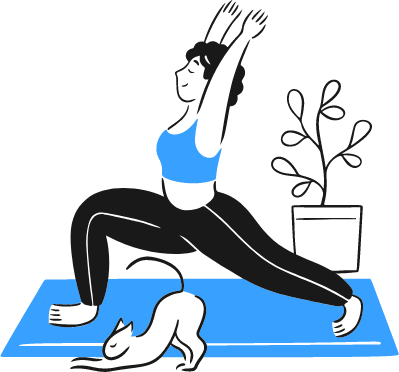
© Precision Nutrition
Depending on what’s going on in your life right now, you might get a Deep Health score that looks like this:
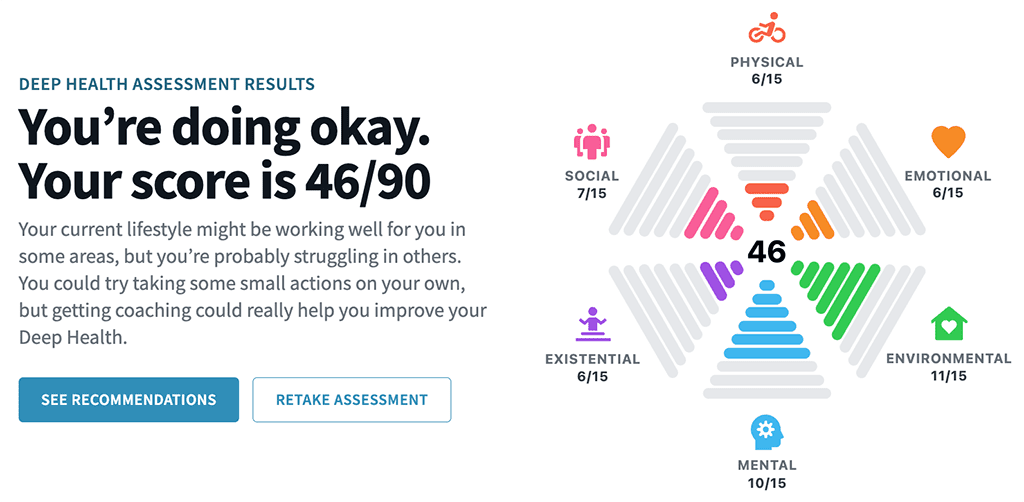
Or like this:
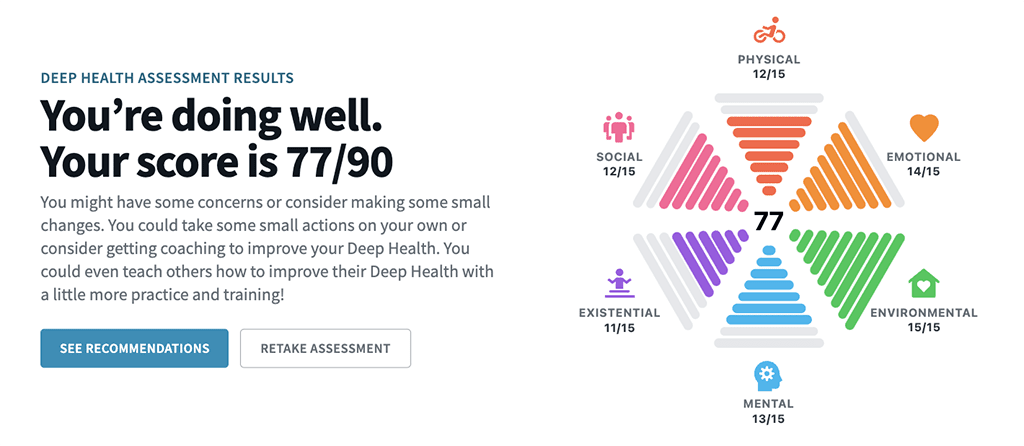
Or this:
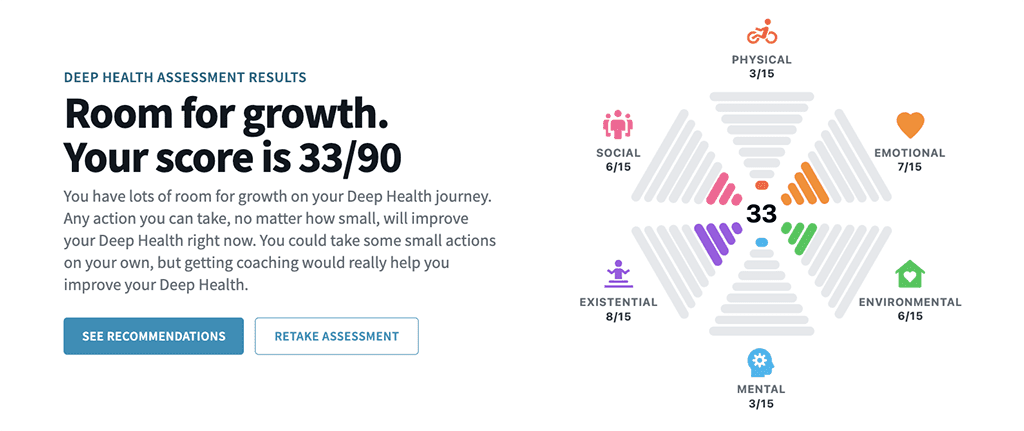
Whatever your results (and no judgment on the numbers), the distribution of your score can tell you:
- Where you’re currently thriving
- Where you have the largest opportunities for growth and improvement
- Where you might be able to make some easy improvements
- Which dimensions, if you improve them, might best help you reach (and sustain) your goals
Your personalized assessment will make some suggestions. (The below is a sample screenshot.)
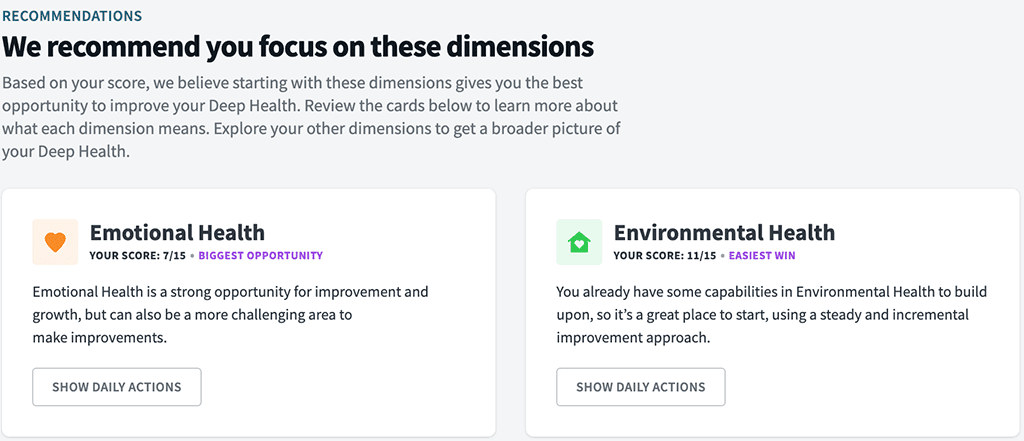
But of course, it’s entirely up to you where you decide to focus, and what actions you choose to take next—if any.
Let’s walk through an example
Let’s say you’ve recently become interested in optimizing health and longevity.
You’ve been listening to podcasts, you’ve read the articles about people “reversing” their biological age, and you feel fired up about it.
You haven’t felt so passionate or inspired about your health in a long time, and you’re excited to try some of the strategies recommended in those podcasts and articles. (You want to be 27 again! At least, your cells do.)
At the beginning of this journey, let’s imagine your Deep Health looks like this:
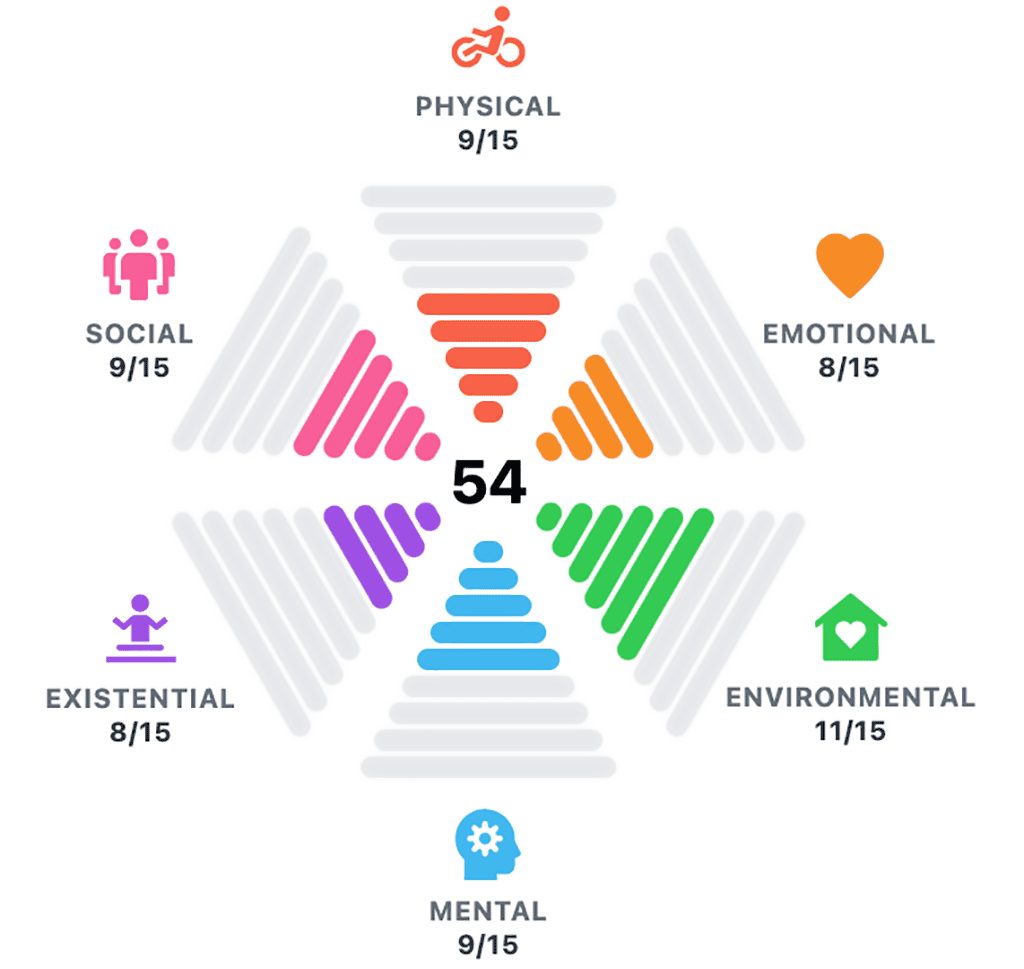
Kind of “so-so” all around. Definitely, there’s room for improvement.
Of course, in reality, there’s infinite pathways you could take. But let’s imagine two scenarios…
Scenario A: Biohack like a beast
After seeing your Deep Health score, you decide to simply tackle everything at once:
- You subscribe to a longevity-boosting supplement program, that has you taking about 20 different tablets and powdered elixirs per day.
- You start practicing 16:8 fasting (in each 24-hour cycle, you fast for 16 hours, and eat within an 8 hour window), eating only two meals per day.
- You start eating fully plant-based, getting in tons of veggies, fruits, and legumes, and start tracking your macros meticulously.
- You incorporate four 45-minute zone 2 cardio workouts a week (you heard that’s the amount needed to see significant benefit to your mitochondria).
- You also add two 60-minute resistance training sessions a week.
- You start taking cold plunges at the gym multiple times per week, and are even considering buying a cold plunge tank for your home.
For two weeks, you feel on top of the world.
Then, not so much. (You’ve actually grown to hate that green sludgy stuff you drink every morning.)
You continue to show up anyway with a gritty determination, and for months, follow your protocol as best as you can.
You forego social events, finding yourself grouchy and irritable. (When everyone else is munching on buttery canapés, you’re counting down the hours until your next feeding window.)
Every day feels like a Sisyphean effort, and you begin to wonder what the point of all of it is. You can’t imagine doing this for the rest of your life, which you’re (now ironically) trying to extend.
Eventually, all this white-knuckling in pursuit of optimal health starts to take a toll. On you, your marriage, your social life, and your mental and emotional wellbeing. And you want to know if all of this effort and suffering are worth it.
After several grueling months, you gather some data.
Your blood work looks awesome. You’re definitely leaner. And your biological age test tells you your rate of aging has slowed and your cells have gotten younger.
You’re… winning?
You decide to reassess your Deep Health, and it looks like this:
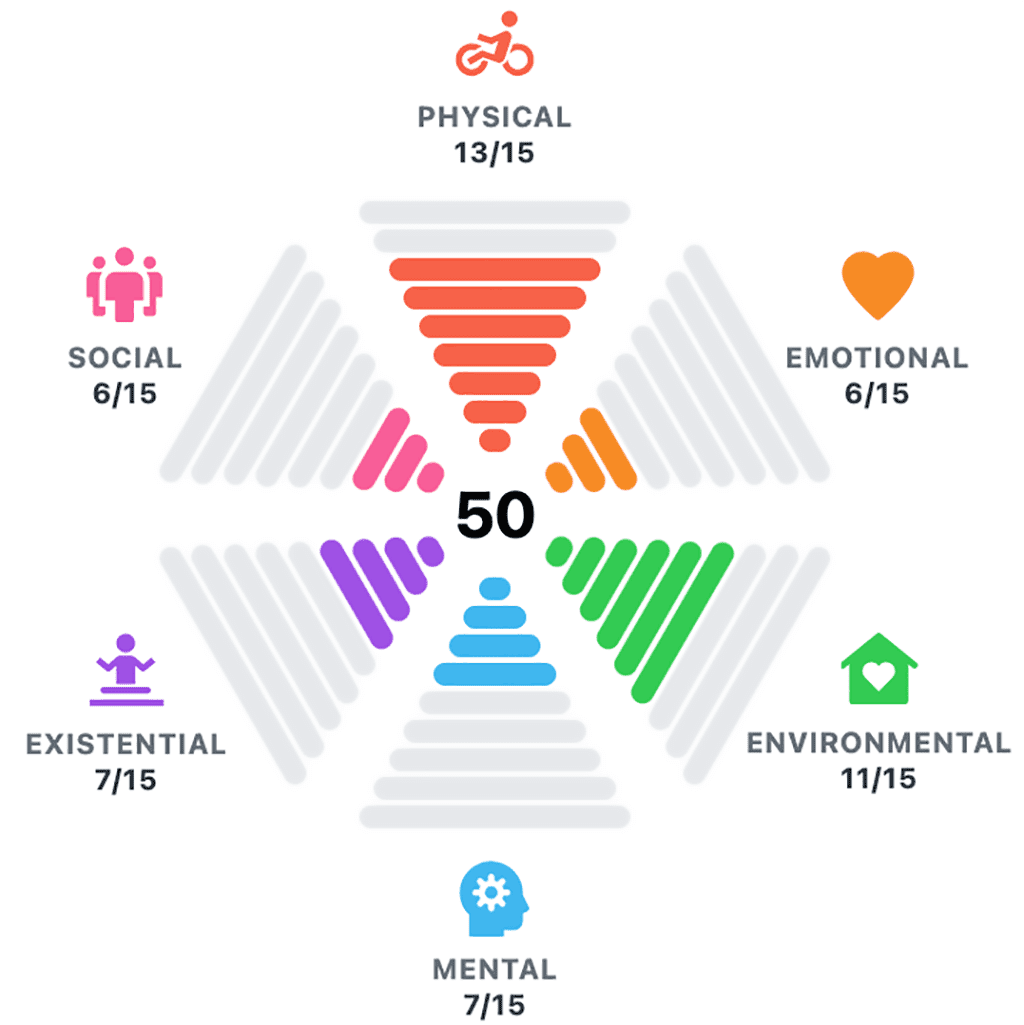
Your physical health has gone way up, but your emotional, social, mental, and existential health have all gone down. Overall, your Deep Health is somehow worse! (Argh!)
It becomes clear to you: While your “do all the things” protocol might help you live longer—it’s definitely not helping you live better.
Scenario B: Dig deep for Deep Health
In this scenario, you take a different approach.
Seeing your Deep Health starting point, you consider that list of “high impact habits” above.
You’re not sure which one to start with though, so you take some time to think about why you’re really interested in this whole longevity thing.
What’s your deeper purpose for wanting to live a longer, healthier life?
You think about your family, and tears come to your eyes when you conjure up the thought of your children having children, and imagining yourself tumbling around with a bunch of rambunctious grandkids. You want to be healthy, strong, and capable of playing with them.
This deep purpose aligns with your identity too. You’ve always been a “family guy,” and now you add a new layer on top of that: You decide to become the kind of person who makes their health and wellbeing a priority, so they can be there for their family for as long as possible.
With this new, revised identity and a clear purpose in mind, you begin to make some changes over time.
- You focus on eating protein at most every meal, and up your fruit and vegetable game too.
- You practice self-compassion when you can’t or just don’t get in as much protein or produce as you’d like. You also work on viewing your choices on a continuum—rather than simply “good” or “bad.” This flexibility helps you feel a sense of freedom in your diet, and feels a little more realistic, long-term.
- Instead of going for the “perfect” four cardio sessions, you aim for two a week, for as long as you can fit in (which sometimes is only 20 minutes, but you do your best). Any extra sessions are a bonus.
- You’re diligent with your resistance training, but you cap them at 30-45 minutes, twice per week (occasionally you only have 20 minutes for these sessions too, but you focus on consistency over perfection).
- You begin going for outdoor walks after dinner with your partner—sometimes inviting a few neighborhood friends, too—and enjoy the deep yet fun conversations you have about work, family, and life (and, let’s be honest, some good neighborhood gossip).
After several satisfying months, you gather some data.
Your blood work has improved. You’ve leaned out a touch too. Your rate of aging has also slowed and your biological age has decreased, seemingly just as much as Scenario A.
But the biggest difference: You enjoyed this process.
You found it not only physically beneficial, but also socially enriching, mentally and emotionally enlightening, and deeply meaningful.
You reassess your Deep Health, and it looks like this:
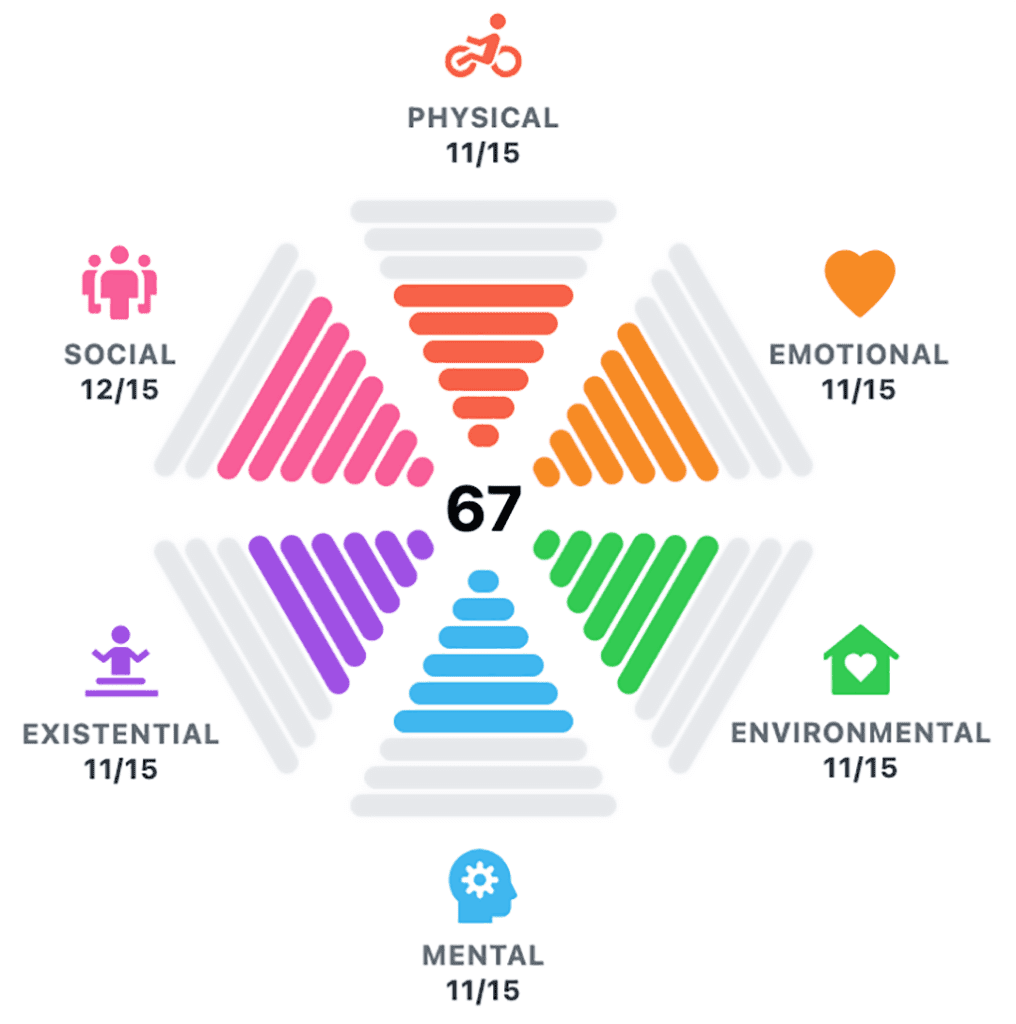
Your physical health has gone up (though not quite as high as Scenario A), and so has your emotional, social, mental, and existential health. Your overall Deep Health is now undeniably, significantly up.
The funny thing: It didn’t even seem that hard.
Moreover, you feel more inspired and energized than ever to take even more steps to further invest in your health and wellbeing.
This is the power of Deep Health.
It’s not just about improving your biological age or increasing your healthspan (which mostly center on physical health metrics).
Striving for Deep Health means working to thrive in ALL areas of your life—not just the physical. Because no single aspect of your health functions alone.
With the push towards longevity and healthspan, and the focus on things like biological age and “biohacking” for optimal aging, it can be easy to forget that we already know the fundamentals of what it means to experience a life well lived.
The truth is, scientists don’t know everything that improves our biological age. Or even the best ways to measure it.
However, if you’re thriving in all dimensions of your health and wellbeing—in other words, achieving Deep Health—you can bet you’re doing all of the things that matter most in living a long, healthy, rewarding life.
References
Click here to view the information sources referenced in this article.
1. Nakamura, Julia S., Joanna H. Hong, Jacqui Smith, William J. Chopik, Ying Chen, Tyler J. VanderWeele, and Eric S. Kim. 2022. “Associations between Satisfaction with Aging and Health and Well-Being Outcomes among Older US Adults.” JAMA Network Open 5 (2): e2147797.
2. Levy, Becca R., Martin D. Slade, Suzanne R. Kunkel, and Stanislav V. Kasl. 2002. “Longevity Increased by Positive Self-Perceptions of Aging.” Journal of Personality and Social Psychology 83 (2): 261–70.
3. Block, Victoria J., Elisa Haller, Jeanette Villanueva, Andrea Meyer, Charles Benoy, Marc Walter, Undine E. Lang, and Andrew T. Gloster. 2022. “Meaningful Relationships in Community and Clinical Samples: Their Importance for Mental Health.” Frontiers in Psychology 13 (May): 832520.
4. Cook Maher, Amanda, Stephanie Kielb, Emmaleigh Loyer, Maureen Connelley, Alfred Rademaker, M-Marsel Mesulam, Sandra Weintraub, Dan McAdams, Regina Logan, and Emily Rogalski. 2017. “Psychological Well-Being in Elderly Adults with Extraordinary Episodic Memory.” PloS One 12 (10): e0186413.
5. Holt-Lunstad, Julianne, Timothy B. Smith, and J. Bradley Layton. 2010. “Social Relationships and Mortality Risk: A Meta-Analytic Review.” PLoS Medicine 7 (7): e1000316.
6. “Harvard Second Generation Study.” n.d. Harvardstudy. Accessed May 16, 2024. https://www.adultdevelopmentstudy.org/
7. Shiba, Koichiro, Laura D. Kubzansky, David R. Williams, Tyler J. VanderWeele, and Eric S. Kim. 2022. “Purpose in Life and 8-Year Mortality by Gender and Race/Ethnicity among Older Adults in the U.S.” Preventive Medicine 164 (107310): 107310.
8. Hill, Patrick L., and Nicholas A. Turiano. 2014. “Purpose in Life as a Predictor of Mortality across Adulthood.” Psychological Science 25 (7): 1482–86.
If you’re a coach, or you want to be…
You can help people build sustainable nutrition and lifestyle habits that will significantly improve their physical and mental health—while you make a great living doing what you love. We'll show you how.
If you’d like to learn more, consider the PN Level 1 Nutrition Coaching Certification.
The post The PN framework that improves healthspan, longevity, and quality of life appeared first on Precision Nutrition.







